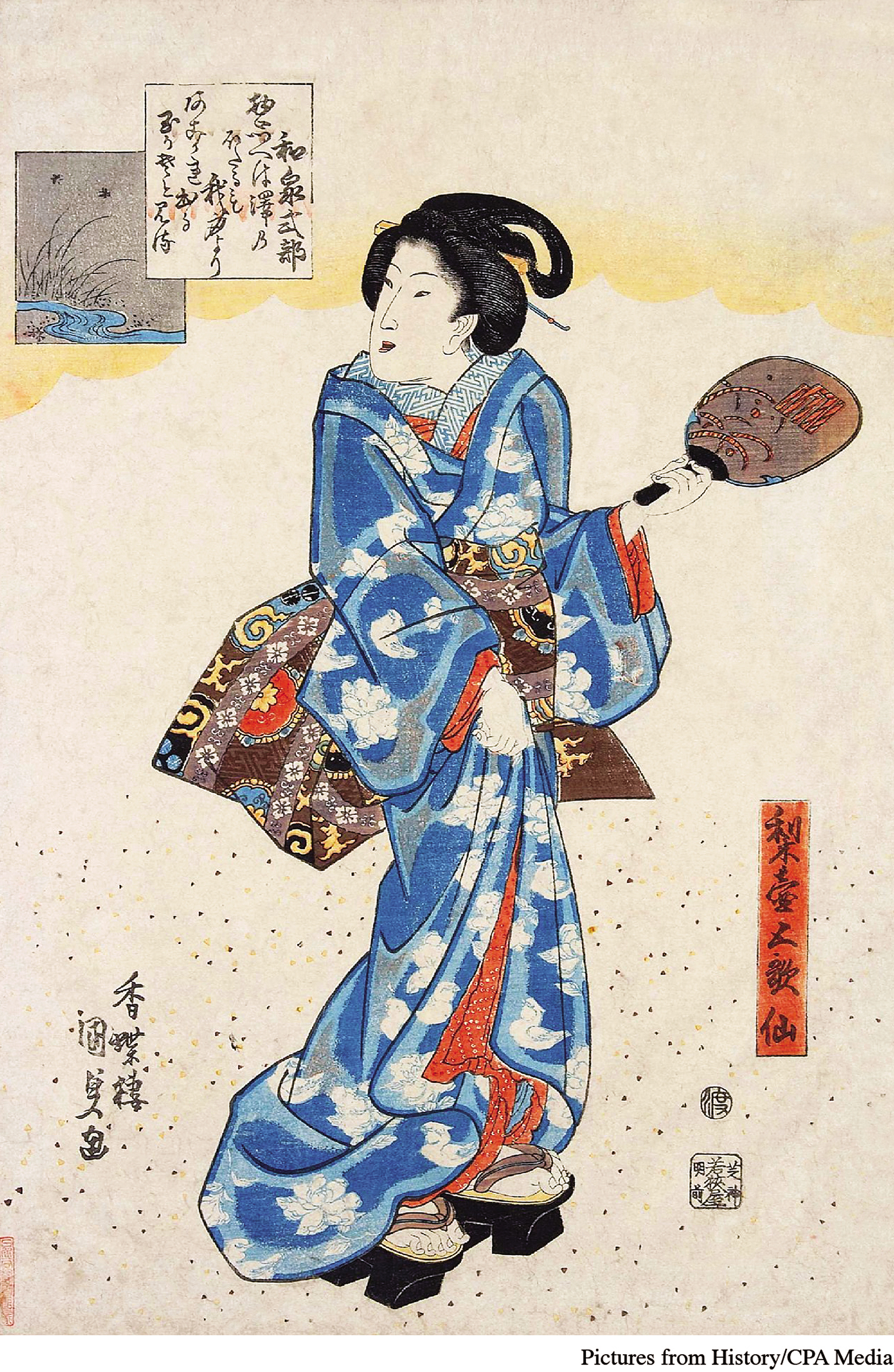ZOOMING IN: Izumi Shikibu, Japanese Poet and Lover

Izumi Shikibu. photo: Pictures from History/CPA Media
Nowhere in world history has poetry played a more central role than in the imperial court of Japan, located in the capital city of Heian-kyo (now Kyoto) between the ninth and twelfth centuries. There, amid the political posturing and the love affairs of aristocratic women and men, almost every event, public or private, called for a poem—the first sighting of spring blossoms or a new moon; births, deaths, and marriages; various official rituals; the morning after a romantic encounter. “It is poetry,” wrote one famous Japanese author in the early tenth century, “which … awakens the world of invisible spirits …, softens the relationship between men and women, and consoles the hearts of fierce warriors.”20 Izumi Shikibu, Japan’s most illustrious female poet, was a master of this art, particularly in the lyric five-line, thirty-one-syllable form known as tanka. In her exquisite poetry, we can catch a glimpse of her erotic intensity, expressed in many scandalous love affairs, as well as her engagement in more spiritual pursuits.
Born around 975 as the daughter of a mid-level official, Izumi grew up in the imperial court, where a literary education was essential for girls of her status, for at least in matters of poetry and the arts, women and men operated on an equal basis. At about the age of twenty, Izumi married a provincial governor, but she soon began an affair with Prince Tametaka, son of the emperor, shocking court society partly because of the sharp difference in their social positions. Tametaka’s death in 1002, widely credited to his sexual excess with Izumi, only deepened the scandal and led to Izumi’s divorce from her husband and estrangement from her family. Addressing her parents and sisters in a poem, she declared: “One of you / I was, but am no more.”21
Less than a year later, she ignited another scandal by taking up with Tametaka’s brother, Prince Atsumichi. The first year of this affair became the subject of Izumi’s famous Diary. When the prince sent her a sprig of orange blossoms, she responded with a poem: “Rather than recall / in these flowers / the fragrance of the past, / I would like to hear this nightingale’s voice, / to know if his song is as sweet.” What followed was a year of nocturnal visits, frequent absences, rumors and gossip, doubts and longings, and the endless exchange of poems. Finally, Izumi took up residence in the prince’s compound, much to the distress of his principal wife. Atsumichi’s death in 1007 prompted an outpouring of poetry mourning the loss of her great love. “I long for the sound / of your voice. / The face / I see so clearly / doesn’t say a word.”22
Despite Izumi’s behavior, she was subsequently appointed as a lady-in-waiting for the Empress Akiko, for her literary reputation added splendor to the court. But the scandal of her personal life continued to shadow her. A rival literary figure at the court, the renowned Lady Murasaki, author of The Tale of Genji, commented, “How interestingly Izumi Shikibu writes. Yet what a disgraceful person she is.”23 A subsequent marriage to a much older provincial governor took Izumi away from the court for the rest of her life. But her affairs continued. “I do not feel in the least disposed to sleep alone,” she wrote.24
Her poetry gave frequent expression to erotic love and to the anguished yearning that accompanied it. “Lying alone, / my black hair tangled, / uncombed / I long for the one / who touched it first.” To a monk who left his fan behind after a visit, she wrote, “I think / you may have briefly forgotten / this fan, / but everyone must know / how it came to be dropped.”
Izumi’s experiences of love within her social circle gave her an acute sense of the ephemerality of all things. “Come quickly—as soon as / these blossoms open, / they fall. / This world exists / as a sheen of dew on flowers.” Her understanding of impermanence was reinforced by her Buddhist faith with its emphasis on the transience of human life. From time to time, she felt the desire to withdraw into a monastery, and she did take periodic retreats in mountain temples. Even there, however, Izumi experienced the pull of the world. “Although I try / to hold the single thought / of Buddha’s teaching in my heart, / I cannot help but hear / the many crickets’ voices calling as well.”25
Perhaps Izumi’s best-known poem was composed when she was still in her teens, though it has sometimes been viewed as a prayer on her deathbed. Written to a Buddhist cleric, it reveals her early and continuing desire for spiritual enlightenment, symbolized here as the light of the moon. “From utter darkness / I must embark upon an / even darker road / O distant moon, cast your light / from the rim of the mountains.”26
Question: How do you understand Izumi’s involvement in multiple love relationships and her religious sensibilities?
